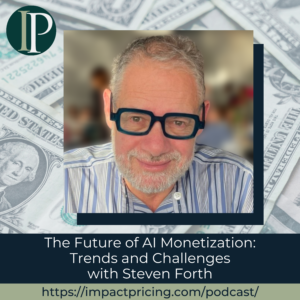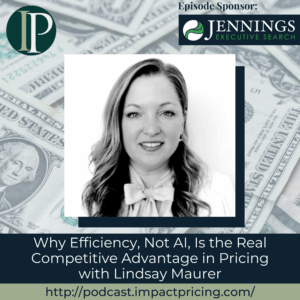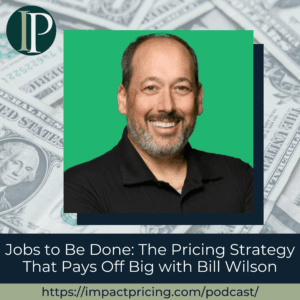Steven Forth is Ibbaka’s Co-Founder, CEO, and Partner. Ibbaka is a strategic pricing advisory firm.
In this episode, Steven shares the potential commoditization of AI pricing agents, explaining how their replication and standardization could drive down differentiation and value. He explores the interplay between AI-driven sales and buying processes, emphasizing that businesses must consider how AI will influence purchasing decisions. He also touches on the potential of AI to simplify legal tasks.
Podcast: Play in new window | Download
Why you have to check out today’s podcast:
- Learn how AI-powered pricing agents compare to SaaS models and why they might face rapid commoditization in the evolving AI landscape.
- Discover why AI-driven buying decisions are just as important as AI-powered selling strategies—and what that means for the future of pricing.
- Find out how DeepSeek’s approach to AI training and pricing could shake up the industry, with potential implications for OpenAI and other major players.
“I think that they need to put themselves in the buyer’s shoes and ask themselves, how would I be using AI to make a buying decision?”
– Steven Forth
Topics Covered:
01:23 – Explaining the four types of AI products and how they impact pricing, automation, and value creation
09:51 – Exploring whether AI agents will become commoditized
12:46 – How complex pricing workflows require multiple AI agents working together as a service, rather than a single standalone pricing agent
14:17 – Explaining that differentiated AI agents with better performance will still command higher prices
19:20 – Highlighting how DeepSeek’s advancements in post-training optimization and lower pricing could drive broader AI adoption
21:20 – What makes AI agents more prone to commoditization
23:22 – How SaaS solutions are less prone to commoditization than AI agents
26:32 – Suggesting that tasks like real estate conveyance could be automated by AI agents
29:02 – Steven’s best pricing advice
Key Takeaways:
“A lot of the use cases for outcome-based pricing or results-based pricing really only become relevant when an action is taken on your behalf. And you can evaluate the value of that action and the success of that action.” – Steven Forth
“Are all agents by nature more subject to commoditization than other parts of the ecology, like copilots or service as software or generators? My gut feeling is that there are going to be agents that are highly differentiated because they rely on highly customized underlying language models and highly tuned prompt sequences that would not be easy for someone else to recreate. And that they’ll be able to make better decisions.” – Steven Forth
“Apart from very specific and narrow cases, I don’t think pricing is going to be done by agents. Pricing will be service as software.” – Steven Forth
People/Resources Mentioned:
- Grammarly: https://www.grammarly.com
- Copilot: https://copilot.microsoft.com/onboarding
- ChatGPT: https://chatgpt.com/
- Hugging Face: https://huggingface.co
- Hubspot: https://www.hubspot.com
- FinnAI: https://www.finnai.io/en
- LegalZoom: https://www.legalzoom.com
- Zendesk: https://www.zendesk.com
- Microsoft: https://www.microsoft.com/
- Pros: https://pros.com
- Vendavo: https://www.vendavo.com
- Zilliant: https://zilliant.com
- Pricefx: https://www.pricefx.com
- Maxio: https://www.maxio.com
- DeepSeek: https://en.wikipedia.org/wiki/DeepSeek
Connect with Steven Forth:
- LinkedIn: https://www.linkedin.com/in/stevenforth/
- Email: [email protected]
Connect with Mark Stiving:
- LinkedIn: https://www.linkedin.com/in/stiving/
- Email: [email protected]
Full Interview Transcript
(Note: This transcript was created with an AI transcription service. Please forgive any transcription or grammatical errors. We probably sounded better in real life.)
Steven Forth
I think that they need to put themselves in the buyer’s shoes and ask themselves, how would I be using AI to make a buying decision?
[Intro / Ad]
Mark Stiving
Welcome to Impact Pricing, the podcast where we discuss pricing, value, and the deepening relationship between them. I’m Mark Stiving, and I run bootcamps that help companies get paid more. Our guest today is Mr. Steven Forth. Steven invited Michael Menzar and me to join him on an Ibbaka webinar about the monetization of AI. What an incredible topic. And we came up with some other things we needed to talk about just based on that webinar. So, welcome, Steven.
Steven Forth
Delighted to be here, as always.
Mark Stiving
First off, I’m going to say thank you to the whole world. I’m going to say thank you to you in front of the whole world for turning me from an AI skeptic to an AI advocate. I’m now trying to figure out how to help more and more people use AI to get their jobs done better, whatever that happens to me. So it’s pretty cool.
Steven Forth
It is transformative.
Mark Stiving
It really is. So when we did the webinar, it was an hour of fabulous content. Everybody should go back and find that webinar and listen to it, because one of the best webinars I’ve ever participated in was really good. But one of my favorite concepts you brought up were the four types of AI products. And so can you briefly go over those so that we can launch into the topic that we really want to talk about today?
Steven Forth
Yeah. So as we’ve been researching and engaging with people on how AI creates value and how they’re going to be monetized and packaged and pricing built, we’ve started to see some patterns emerging. So most of what we are talking about today when we talk about AI is generative AI. And I’d say probably 70% of that is transformer AI based on language models. So we thought of two dimensions.
Mark Stiving
So before you go too far, I just want to simplify this as we go. So that means ChatGPT.
Steven Forth
ChatGPT is a good example of a transformer-based language model. And in fact, the GPT stands for general pre-trained transformer.
Mark Stiving
Okay, perfect.
Steven Forth
That’s what GPT means. So theoretically you could have lots of general pre-trained transformers. It’s just that OpenAI decided to grab that terminology. So at the basis of this, you have what we call generators, and generators are things that when asked to generate content. So they are not continuous. They’re responding when you ask them to do something. So one dimension is sort of continuity, and the other is autonomy. And they’re not very autonomous.
Mark Stiving
You have to ask it.
Steven Forth
You have to ask it. And, as you know, sometimes this can involve creating quite complex, long prompt sequences, but they are the foundation of everything else. ChatGPT is an example of what we’re calling a copilot. And a copilot is something that is always available to you to help you do your work. And I think Microsoft, which really has branded copilots, has done the best job. And a copilot sits on your shoulder as you work with your spreadsheets, with your presentations, with your databases, and it helps you along the way.
Mark Stiving
So prior to the whole ChatGPT popularity, I was using Grammarly. And so Grammarly would be a co-pilot, an example of a co-pilot.
Steven Forth
Grammarly is also a very good example of a co-pilot, and still a very valuable co-pilot, I would say.
Mark Stiving
Works great for me.
Steven Forth
Yeah. More people should use it, including myself. But, and I apologize for the complex and convoluted nature of some of my prose. I need Grammarly, but that’s a perfect example. You know, it’s there when you need it. It’s often observing what you do. Not always, but copilots can be sitting on your shoulder and observing what you do, and they’re there to help. Agents are quite different. I think everyone knows this year is being touted as the year of the agent. And there are easily a thousand different B2B AI agents being brought to market in 2025. Agents are fundamentally different in that they have the ability to make a decision and act quasi- autonomously. Now, in many cases, that autonomous action still needs human approval. So there’s still human in the loop, and I believe that over the weekend, so we’re talking, I think today on February 10th over the weekend, HubSpot announced that, not HubSpot, I’m sorry, Hugging Face announced that any agent should have a human in the loop and a kill switch. And that they’ll be careful that any agents that they make available through Hugging Space will have those properties. But an agent is something that can take an autonomous action for you. And we’ve seen these a lot in stock trading where algorithmic trading is really a set of very sophisticated algorithms that are making trading decisions for you and faster than any human would be able to to make them.
Mark Stiving
Would you also put chatbots here?
Steven Forth
It depends if the chat bot is actually able to make a decision. So for example, the Intercom FinnAI agent that is able to actually get to a customer support ticket resolution and decide that the ticket is being resolved. It’s acting as an agent. But a chatbot that can make a decision on where to route you. So for example, many of the chatbots that you see popping up on the bottom right of your screen are actually meant to make a routing decision that the company makes to take you to the right place. In that case, they’re their agents. In other cases, they work more like co-pilots.
Mark Stiving
Okay.
Steven Forth
So the critical thing here is does it actually make a decision?
Mark Stiving
Okay, perfect.
Steven Forth
A lot of the use cases for outcome-based pricing or results-based pricing really only become relevant when an action is taken on your behalf. And you can evaluate the value of that action and the success of that action.
Mark Stiving
That was brilliant. I hadn’t thought of that before.
Steven Forth
And then the other emerging model for commercializing AIs is what’s called service as software or service as a software. Service as a Software bothers me for some reason. So I prefer the service as software and a name. And that’s where you take a business process. And it can be a fairly complex business process and execute it through a service. So if you think about it one of the earlier services as software examples is the applications that file your taxes for you. And there are fairly sophisticated applications. They’re a combination of agents and co-pilots that you stitch them together and they actually perform a complete service. So we’re seeing more and more of that sort of service as software solutions being proposed. I don’t think there are a huge number yet and as we said, this year everyone’s attention is on agents.
Mark Stiving
So do you think LegalZoom fits in service as software?
Steven Forth
It’s getting there. This is a continuum right there, there’s a bit of a gray area, but LegalZoom is absolutely getting there. And we’re going to see more and more things that you would normally have gone to as a service. And you’re going to have service as a software performing it, designing a house.
Mark Stiving
I feel sorry for my bookkeeper.
Steven Forth
Yeah. But do you really think your bookkeeper enjoys their work? I don’t know. I guess some people, but enjoy the work.
Mark Stiving
She enjoys the paycheck.
Steven Forth
No, but this will free her up to do higher value work for you.
Mark Stiving
Okay. Excellent.
Steven Forth
And you’re going to be making so much more money because of your generative AI leverage that you’ll be happy to pay her that extra money because she’s adding more value to you and you’re creating more value.
Mark Stiving
Okay. Love to hear that.
Steven Forth
This is the option deal anyway.
Mark Stiving
Yeah, okay, now, the reason that we decided that we wanted to have this conversation is in the webinar. I had some wild thoughts that said, in the world of agents, I think we’re all going to go to cost or cost-plus, and it’s going to become a commodity. And you said you think maybe not, but that deserves a longer conversation.
Steven Forth
So guess what? Well, let’s have that conversation. So let’s unpack that. So economics 101 would argue that cost goes to the marginal, I mean, price will trend the marginal cost. And so I think your argument is that agents have a very low marginal cost, not zero, but low.
Mark Stiving
I think there’s a more important part to that argument. And that is that agents are easily copyable. There’s not going to be that much differentiation in the long run for different agents.
Steven Forth
Well, I think that’s the critical question, right? Is how differentiated will agents be and if it’s an agent that does, if it’s the kind of agent that is good for outcome-based pricing. So for outcome-based pricing, you have to meet three conditions, right? You have to be able to agree on the outcome, you have to be able to agree on the attribution for the outcome. And you have to be able to have some level of predictability. So, and this is a new thought for me, but just sort of riffing off what you said. So if you meet those three things, you probably don’t have a huge amount of differentiation either. Your differentiation is really measured purely in terms of your outcomes and your predictability. So in that case, I think we’re going to see rapid commoditization, and it will be really interesting to see with FinnAI, FinnAI is getting commoditized by Zendesk, by Microsoft, by OpenAI.
Mark Stiving
So let me throw out an example if I can. A friend of mine the other day said, ‘Hey, I’m going to create this new business and I want to create buyer personas using AI.’ And so you could easily see crafting an agent to create a buyer persona. But, as soon as you do that, there’s nothing that stops me from doing that. Right? I’m going to go create a buyer persona agent. By the way, I could just go into ChatGPT and type in my criteria anyway and get a buyer persona out. So I don’t really need someone like that. But, then I think about what you and I do, and that is the world of value and value models and how it actually is a bunch of complicated steps to get to the end point. And that feels to me more like we can differentiate it, but I don’t know that you can put it in as an agent at that point.
Steven Forth
Yeah. But I think, yeah, I think that’s the critical thing, right? So let’s take the whole workflow of starting from the initial need by a customer, need by a company to have a pricing model and go through all of the steps that are involved in that. So you need to generate a value model. You need to validate that value model in some way. You need to analyze the value model. You need them to map the value model to business use cases, possibly do personas, possibly do functions to value driver mapping. You need to get to bundling. You need to explore different pricing options for those different bundles. You need to do some price optimization. You need to have an adaptive response to the market. Doesn’t sound like one agent to me, that sounds like 50. But they’re orchestrated together into services software. So do I think there’s going to be a pricing agent? I think there could be highly transactional things. If you think about it, highly transactional purchases could be priced by and bought by agents.
Mark Stiving
So there are a lot of pricing software companies that do black box AI pricing today. Right? And so we could say, yeah, that’s an agent, or you could even call it SaaS if you wanted to, if someone’s just implementing it.
Steven Forth
Yeah. So they’re not structured as agents as far as I know today. So if you look at Pros and PriceFX and Vendavo and Zilliant and so on. They have not structured their offers as agents. I don’t think their underlying technology lends itself to doing that, but some new company could very well come up with a pricing agent that optimizes pricing for single transactions. I’m pretty sure that any market in which you can create that agent, there will also be a buying agent.
Mark Stiving
Probably.
Steven Forth
So you’re you’re going to have two agents negotiating with each other, which I think is actually another interesting thing for us to discuss, because there’s been a lot of focus on the use of AI in the sales process that sometimes seems to forget that anything that sales does, the buyers are going to respond to. So we’re going to see a lot of AI used in the buying process as well. But coming back to your question, to the original question we wanted to discuss, are all agents by nature more subject to commoditization than other parts of the ecology, like co-pilots or services software or generators. So my gut feeling is that there are going to be agents that are highly differentiated because they rely on highly customized underlying language models and highly tuned prompt sequences that would not be easy for someone else to recreate. And that they’ll be able to make better decisions. So let’s take an American sports example, a timely one: almost all of us can throw a football, and most of us can catch a football if it’s well thrown, some of the time anyway. But there are some people out there that are incredibly good at throwing footballs, people that can catch stuff that you and I would never be able to catch. and they’re doing the same thing, but they’re highly differentiated and they make a lot of money for those specific skills.
Mark Stiving
So here’s the point. It’s, that’s the winner take all theory that says, ‘Look, being just a little bit better at catching a football makes the team a lot of money?’ You and I being a little bit better at pricing than someone else is okay. But it doesn’t, it isn’t like, ‘Hey, we get hired or don’t get hired based on the fact that we’re the best.’
Steven Forth
I think pricing as I said, apart from very specific and narrow cases, I don’t think pricing is going to be done by agents. Pricing will be service as software.
Mark Stiving
Yeah. So whether it’s pricing, it’s the whole winner take all theory that says, ‘Look, if it’s a competition and I have to win the game game, then yeah, I’m going to pay a whole lot more for the marginally better thing?’ But if it’s not a winner take all, and it’s not a competition in that someone wins it, then buying the second best at a whole lot lower price is fine with me.
Steven Forth
Yeah. But that you would still pay at least something more for a differentiated agent that had better performance.
Mark Stiving
Yes.
Steven Forth
So I don’t think we’re changing the sort of ground rules of pricing here. I mean, if something is differentiated and provides more value, you’ll pay more for it. Now, how much more will you pay? Depends on the dynamics of the industry. So algorithmic trading, with where either you’re right or you’re wrong on every trade. Every trade is either you make money or you lose money. There’s no gray area. So those areas where there’s an absolutely right or wrong answer I think we might slip into more of a winner take solve mode where there’ll be a lot of price differentiation between the top performer
Mark Stiving
I can’t keep up with all the names of these things, but the new Chinese AI that just came out.
Steven Forth
DeepSeek.
Mark Stiving
DeepSeek and rumor has it that they trained using ChatGPT or OpenAI information. And so if you just say to myself, ‘Hey, Steven Forth built this amazing agent, I’m going to use his agent to train my agent.’
Steven Forth
Now, that’s not a completely comparable thing because that’s not really what DeepSeek did. And I’m not, who knows, did DeepSeek find a way to get OpenAI’s model and then train on top of that model? If they did. What on earth is wrong with OpenAI security.
Mark Stiving
Yes.
Steven Forth
But regardless, you’ve identified a really interesting dynamic, right? That’s probably going to happen in agent space, where you treat an agent as a black box, you do lots of inputs, you see what the outputs are, and in almost every case, you’ll be able to replicate that black box very quickly. So that’s an interesting dynamic. And basically what as I understand it, what DeepSeek did is that they found a better way to do the post training optimization. And is it a huge game changing advance? Maybe not, but it’s super smart and everybody’s going to adopt it. So thank you DeepSeek. And if their pricing holds, because their pricing is what it’s like 80% less than Open AIs. Great. That’ll just make it easier for the rest of us to adopt generative AI in all sorts of interesting new ways.
Mark Stiving
Yeah.
Steven Forth
But coming back to your question, are agents, why their very nature is prone to more rapid commoditization than other approaches to AI? Yeah, I mean, you’re getting me to change my mind and think, ‘Yeah. When you think about it, given the fact that you could train an agent against agents and rapidly replicate it and agent, the current generation of agents tend to be doing fairly discrete, easily defined things. Yeah, maybe they are going to be more subject to commoditization.’ Now, tomorrow morning, so this is the 10th. So on February 11th Ibbaka and Maxio are going to be launching a new piece of research together where we look into the monetization of agents. And are there patterns appearing in the monetization? And this conversation is getting me to think that I should probably take a look at commoditization patterns in agents. I’ll have to think about how we could see that, especially at this point in 2025, where it’s still relatively early in the game.
Mark Stiving
Right. It’ll certainly be a time study where you get to see what happens over time.
Steven Forth
Yeah. And commoditization implies two things, right? One is that the functionality gets standardized and two, that the prices become more and more uniform.
Mark Stiving
Yep. Okay, so now, I want you to push back on the next one. Let’s pretend that it’s true that agents become commoditized. Why doesn’t the exact same thing hold true in SaaS, right? It’s going to take longer. It’s more complicated. I’m totally with you.
Steven Forth
I think it wouldn’t, in part because the outcomes are more open, so…
Mark Stiving
…more open-ended.
Steven Forth
Yeah. And they’re more exploratory. I forget who did it, maybe Klein the guy who did the research into high performance teams, but there’s one kind of team that is a goal meeting team. You give the team clear goals and it goes out and it meets those goals. But there’s another kind of team that is a goal seeking team where it has to define and constantly redefine what goals it’s trying to achieve. And I think that most innovation-driven companies are goal-seeking teams, not goal-meeting teams. And I think we’re a long way from having that kind of thing commoditized. And if you take sort of a context-based pricing approach part of that, your goal-context-based pricing is to establish contexts. It’s not just to take a context that’s given, it’s actually to establish the context. That, to me, is much more of an open-ended goal-seeking approach. And it is a goal-meeting approach. So the sort of narrow view of pricing where you’re optimizing a number I think that will be rapidly I would argue that it actually is largely commoditized at this point in time. I don’t think that at that core functionality, there’s that much difference between the old heavy metal pricing systems. Those are pretty mature technologies. They’re wrapped differently.
Mark Stiving
It’s actually kind of interesting, if you think about the difference between an agent, they’re certainly goal-meeting. And you could say a SaaS is goal-seeking.
Steven Forth
SaaS, maybe.
Mark Stiving
Yeah, I’m sure there’s going to be, I’m sure it’s a continuum, let’s put it that way.
Steven Forth
Well, yeah. Look at the one that you brought up, bookkeeping, or tax filing. All I want for my tax filing is it be done fast and that it minimizes my taxes or maximizes the money the government is going to pay back to me.
Mark Stiving
And doesn’t put you in jail.
Steven Forth
And if an ethical breach has occurred that they’re responsible for it, not me. So if somebody’s going to go to jail, it ain’t me.
Mark Stiving
Right.
Steven Forth
But yeah. Now, assuming of course, that I’ve provided them with honest information.
Mark Stiving
And so let’s go to LegalZoom for a second. Because this is actually interesting, right? If I were to hire a lawyer for some reason I probably don’t even know what the outcome is that I want. I probably know the situation that I’m in, but I don’t know the outcome I want.
Steven Forth
Yeah. My solicitor had a good definition. So you said it, a good solicitor’s job is to make sure that you never need a litigator. But since, like most people who’ve been in business, I’ve been in litigation, clearly I needed better solicitors, but maybe I just needed to take my solicitor’s advice better.
Mark Stiving
Yeah. Who knows.
Steven Forth
But I think there’s lots of cases, though, where it’s clear, right? Like when you’re conveying a house in real estate. Conveyancing, there’s no reason that it requires human intervention in today’s world.
Mark Stiving
What does that mean? Here in the US we don’t use those.
Steven Forth
That is transferring the ownership of a house from one person.
Mark Stiving
Got it. Like title transfer.
Steven Forth
Yeah.
Mark Stiving
With you.
Steven Forth
Yeah. I mean, that seems to me to be a, now it’s probably more than just an agent because there’s lots of sub tasks involved. So it’s probably, service as a software. Although maybe it can be boiled down to something simple enough that an agent can do it. Yeah. I don’t know that space well enough.
Mark Stiving
I don’t know either. But I got to tell you, last time I bought a house, I must have signed a hundred documents.
Steven Forth
Yeah.
Mark Stiving
Like, there’s just no reason for that.
Steven Forth
And I would be happy to trust an AI agent to sign those for me because, you know what? I didn’t read them.
Mark Stiving
I know. Absolutely. Steven, we’re out of time. I had two other topics I was going to bring up with you but we ran out of time. So let’s do it again. So I still want to talk to you about generative pricing because I don’t believe in it, and I know you do. And I want to talk to you about token-based pricing and how I think that’s nothing other than cost-plus pricing. And what we can do to get away from it or whatever we’re going to do.
Steven Forth
We’ll find some more time to talk.
Mark Stiving
Sounds great. Steven, as always, thank you so much for your time today. If anybody wants to contact you, how can they do that?
Steven Forth
The best way is by email, Steven, S-T-E-V-E-N, @ibbaka, I-B-B-A-K-A.com. And I am very easy to find and generally quite responsive on LinkedIn.
Mark Stiving
Very active on LinkedIn too. Excellent. I forgot to ask you the last question. Do you have a piece of pricing advice you’d give our listeners that you think could have a big impact on their business?
Steven Forth
Yes. I think that they need to put themselves in the buyer’s shoes and ask themselves, how would I be using AI to make a buying decision?
Mark Stiving
Excellent. And I just have to share with everybody that Steven the other day sent me a prompt that he used for evaluating a product he was looking to buy. And I used the same prompt for something I was looking for, and it’s just, it’s incredible. So you really want to go do this?
Steven Forth
Yeah, absolutely. I think that anyone who’s not doing this is putting their business at risk.
Mark Stiving
Yeah. Excellent. To our listeners, thank you so much for your time. If you enjoyed this, would you please leave us a rating and a review? We did get a review from someone who didn’t enjoy this. NBSFMC left this review about the podcast,
‘Endless pontification. Host clearly doesn’t know as much as his guests. It’s hard to understand why anyone sits through this. He’s constantly patronizing guests, rewording their answers, and generally trying to correct them to make himself seem smarter. It’s not working. His big idea, one good, better, best works for everything, and two cost-based pricing is bad. Avoid.’
Steven, did you write that?
Steven Forth
I did not. And I would not, because for a few reasons. One, is, you want a podcast host that is reaching out to talk to people that know stuff that they don’t know. So good on you. That’s what you’re supposed to be doing. The pontifications charge. I’m sure, guilty as charged.
Mark Stiving
Exactly.
Steven Forth
But sometimes by pontificating, one gets to explore new ideas too. And that’s important in pricing in this part of, in this day and age. Do I think you are an adulterated fan of GBB? I didn’t know you worked for one of those big consulting companies. And cost-based pricing. Yeah. There’s a reason we don’t like it. And we’ll talk about it in another session.
Mark Stiving
We will. Thank you, Steven, and I appreciate that. And finally, if you have any questions or comments about the podcast or if your company needs help getting paid more for the value you deliver, feel free to email me, [email protected]. Now, go make an impact!
[Ad / Outro]

















